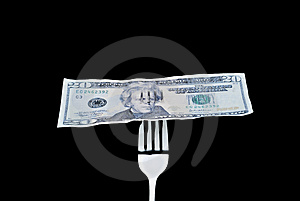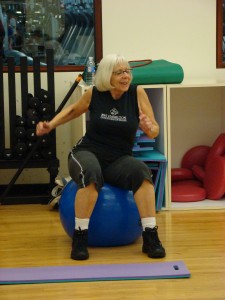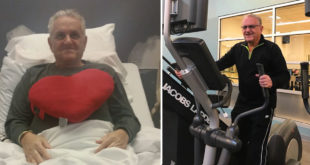by Michelle Sutton-Kerchner
The year is still fresh. Trends as they are, obesity will rise yet again. Over the past 40 years, obesity has increased from 13 percent to 31 percent in the United States adult population. How many will succumb to this epidemic in 2012? Will you be one of them …
Obesity can be frightening. It doesn’t hit like a heart attack, aneurysm, or sudden trauma, though it may contribute to them. Rather, it quietly lingers as part of your physical structure. A silent detriment to your health.
Most don’t even recognize themselves as obese. The term is incorrectly associated with the extremely overweight, physically limited individual. You may be surprised to discover you or a loved one are actually clinically obese. It is one of those tough realizations.
We endearingly view some folks as “chubby,” “round,” or “curvy.” Unlike high cholesterol and other health issues, facing the reality of your weight, or that of a loved one, is a sensitive issue. The fear of offending or insulting prevents us from encouraging action. Yet, like any other health condition, action should be taken before serious consequences occur.
Your body mass index (BMI) is an accurate starting point for determination (because a lot can be hidden with the right clothes). This calculation involves your height and weight. Typically, a BMI over 25 indicates overweight; over 30 indicates obesity. Note there is not a big jump between the two. Yet, tipping to the obese category may trigger additional health threats.
Check with the Center’s Nursing Department for your BMI reading, which is only part of the analysis performed. The Center’s Body Composition/Body Fat Analysis reveals the actual composition of a person’s weight (lean mass in pounds versus fat mass in pounds), plus the actual percentage of body fat in relation to age and gender. This allows a more detailed look at the actual composition of those pounds of weight.
“We use an infrared light on the bicep muscle of the member’s dominant arm. For the most accurate results, this should be done before exercising. It does not hurt. You don’t feel anything,” explains Nurse Manager Margery Cottrell.
For a quick indication, measure your waist. Your waist should remain smaller than your hips. Consider the dangers of a thick middle alone, which include increased risk for heart disease, type 2 diabetes, stroke, and types of cancer. Belly fat is more harmful than fat accumulated in other areas.
Health Consequences

Still reluctant to gently encourage those you care about to lose weight? Not yet motivated yourself to manage a healthy weight? Consider these risks associated with obesity, according to the National Institutes of Health:
- diabetes
- coronary heart disease
- high blood cholesterol
- stroke
- hypertension
- gallbladder disease
- osteoarthritis (degeneration of cartilage and bone of joints)
- sleep apnea and other breathing problems
- some forms of cancer (breast, colorectal, endometrial, and kidney)
- complications of pregnancy
- menstrual irregularities
- hirsutism (presence of excess body and facial hair)
- stress incontinence (urine leakage caused by weak pelvic floor muscles)
- psychological disorders, such as depression
- increased surgical risk
- increased mortality
Economic Impact
All the extra burgers and fries consumed by Americans do not stimulate the economy. The billions spent on weight loss products and services, many of which are gimmicks, don’t help either. Obesity has a negative impact on our nation’s capital. In recent years, United States medical care costs associated with obesity reached a staggering $147 billion annually.

Consider the expense of preventative, diagnostic, and treatment costs with regards to obesity, along with the indirect results of morbidity and mortality costs. For businesses, this may translate as more sick time, less productivity, and restricted activities. Weight loss may not be one’s civic duty; however, it is astounding to realize the impact of an individual’s health.
Convinced Now?
Perhaps now you recognize the need for a healthier reading on the bathroom scale. Don’t be overwhelmed. When loss is recommended or desired, experts emphasize a mere reduction of15 percent of your current body weight can be helpful. Even if not considered obese, many find shedding five to ten pounds improves energy level and overall well-being.
Determine your “fighting weight.” A number that feels acceptable for you may vary from the next person, based on factors like age, activity level, genetics, metabolism, and nutritional needs. You may not be obese, or even overweight, but know your ideal weight– and achieve it– to feel best.
Follow Our Seniors

A detailed study, which focused on obesity in older individuals, confirmed the diet-exercise combination as most effective in battling excessive weight.
According to the study’s principal investigator Dennis T. Villareal, MD, “In older adults, obesity exacerbates the decline in physical performance and leads to frailty, impaired quality-of-life, and higher nursing home admissions.”
Today’s increased lifespan and obesity in elderly populations prompted this investigation. The goal was to determine the most effective way to help seniors remain healthy and independent. About 20 percent of people 65 years and older are obese. This number is expected to rise as baby boomers become senior citizens. Researchers main motive for determining the most effective means of weight loss in seniors was to help facilitate everyday functioning.
The results of this one-year study indicated:
- weight loss alone improved physical function by about 12 percent,
- exercise alone improved physical function by about 15 percent,
- combined diet and exercise improved physical performance by 21 percent.
Physical performance included tasks such as walking 50 feet, putting on and removing a coat, standing up from a chair, picking up a penny, climbing a flight of stairs, and lifting a book. Those of healthy weight do these activities naturally and without thought. Extra weight or added years easily can make such simple doings a challenge.
These numbers further suggest successful weight maintenance requires a lifestyle change. To lose weight — and keep it off– it’s necessary to maintain healthy habits, which include exercise and nutritional monitoring. It requires a lifelong commitment to a healthy way of living.
If you’re struggling with weight issues, clearly you are not alone. The Center, with its holistic approach and medical insight, helps grow a healthier community. Many facilities are about losing pounds. Here, we guide you to a healthier life where weight is only one factor of your being.
Success comes in all shapes and sizes. Perhaps the member next to you in the locker room is a success story. It doesn’t have to encompass losing 100 pounds. It is about countless, everyday improvements as you journey through life. If you aren’t at your ideal weight today, remain steadfast in your commitment. Exercise and proper diet assure your healthiest life possible. Hug yourself and those you love. Confront the truth about a healthy weight.
Schedule your Personal Training and Nutrition Counseling appointments!
Fill out this form to request a consultation on how Personal Training and Nutrition Counseling can benefit you!
Sources
“Diet-Exercise Combo Best for Obese Seniors,” by Jim Dryden at www.obesityinamerica.org.
“Do I Need to Lose Weight?” by Jennifer R. Scott at www.about.com.
“Overweight and Obesity,” at www.cdc.gov.
“What Are the Risk Factors for Being Overweight or Obese?” by Jennifer R. Scott at www.about.com.
Image Credits
Box of fat diet (introductory photo): © Jess at www.dreamstime.com.
Warning sign: http://www.flickr.com/photos/hugosimmelink/2252095723/
Obesity dollars: © Vclements at www.dreamstime.com.
 Fitness & Wellness News Your Source for Fitness News, Wellness News, Health News, and Nutrition News!
Fitness & Wellness News Your Source for Fitness News, Wellness News, Health News, and Nutrition News!



